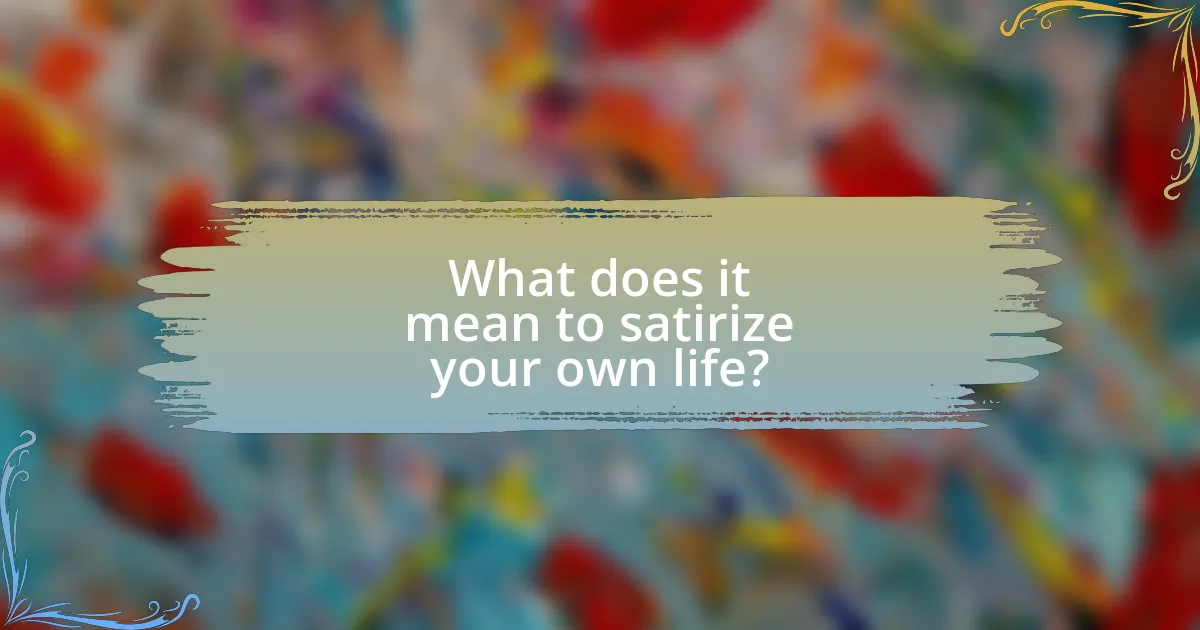The article “How to Satirize Your Own Life: A Guide to Laughing at Yourself” explores the concept of self-satire, emphasizing its role in personal growth and resilience. It discusses techniques such as exaggeration, irony, and self-deprecation to highlight the absurdities of one’s life, while also examining the psychological benefits of laughing at oneself, including enhanced self-esteem and emotional regulation. The article provides practical tips for incorporating self-satire into daily routines, identifies common situations suitable for self-satire, and addresses potential pitfalls, ensuring a balanced approach to humor that fosters connection and understanding.

What does it mean to satirize your own life?
To satirize your own life means to use humor, irony, or exaggeration to critique or mock your personal experiences, behaviors, or circumstances. This self-reflective approach allows individuals to highlight the absurdities or flaws in their own lives, often making light of serious situations. By doing so, people can gain perspective, foster resilience, and connect with others through shared experiences. Satire often involves a blend of wit and honesty, enabling individuals to confront their shortcomings while simultaneously entertaining themselves and their audience.
How can self-satire help in personal growth?
Self-satire can significantly aid in personal growth by fostering self-awareness and resilience. By humorously critiquing one’s own flaws and mistakes, individuals can gain a clearer perspective on their behaviors and thought patterns. This process encourages reflection, allowing for the identification of areas needing improvement. Research indicates that humor, including self-satire, can reduce stress and promote emotional well-being, which is essential for personal development. For instance, a study published in the journal “Personality and Individual Differences” found that individuals who engage in self-deprecating humor tend to have higher self-esteem and better coping strategies. Thus, self-satire not only enhances self-acceptance but also motivates individuals to pursue positive changes in their lives.
What are the psychological benefits of laughing at oneself?
Laughing at oneself provides significant psychological benefits, including enhanced resilience, reduced stress, and improved self-esteem. This self-directed humor allows individuals to cope with life’s challenges more effectively, as it fosters a sense of perspective and diminishes the weight of negative experiences. Research indicates that self-deprecating humor can lead to greater emotional regulation and social connection, as it often makes individuals more relatable and approachable. A study published in the journal “Personality and Individual Differences” by Martin et al. (2003) found that individuals who engage in self-deprecating humor tend to have higher levels of psychological well-being and lower levels of anxiety. Thus, laughing at oneself serves as a valuable tool for promoting mental health and fostering positive interpersonal relationships.
How does self-satire promote resilience?
Self-satire promotes resilience by enabling individuals to confront their flaws and failures with humor, which reduces the emotional impact of negative experiences. This coping mechanism allows people to reframe challenges as less threatening, fostering a mindset that embraces growth and adaptability. Research indicates that humor can enhance psychological well-being; for instance, a study published in the Journal of Personality and Social Psychology found that individuals who engage in self-deprecating humor are often more resilient in the face of adversity. By laughing at oneself, individuals can cultivate a sense of perspective, making it easier to navigate life’s difficulties.
Why is humor important in self-reflection?
Humor is important in self-reflection because it allows individuals to approach their flaws and mistakes with a lighter perspective, facilitating personal growth. By using humor, people can reduce the emotional weight associated with self-criticism, making it easier to acknowledge and learn from their shortcomings. Research indicates that humor can enhance resilience and coping mechanisms, as it promotes a positive mindset and encourages a more forgiving attitude towards oneself. This process not only aids in self-acceptance but also fosters a deeper understanding of one’s experiences, ultimately leading to improved mental well-being.
What role does humor play in coping with life’s challenges?
Humor serves as a vital mechanism for coping with life’s challenges by providing psychological relief and fostering resilience. It allows individuals to reframe difficult situations, reducing stress and anxiety while promoting a sense of control. Research indicates that humor can enhance emotional well-being; for instance, a study published in the Journal of Personality and Social Psychology found that individuals who use humor in stressful situations report lower levels of distress and higher levels of life satisfaction. This demonstrates that humor not only aids in emotional regulation but also strengthens social connections, which are crucial for support during tough times.
How can humor change our perspective on failures?
Humor can significantly alter our perspective on failures by allowing individuals to view setbacks as less daunting and more manageable. When people use humor to reflect on their failures, they often create psychological distance from the negative emotions associated with those experiences, which can reduce stress and anxiety. Research indicates that humor activates the brain’s reward system, promoting feelings of happiness and resilience, which can lead to a more positive outlook on challenges. For instance, a study published in the journal “Psychological Science” found that individuals who employed humor in the face of adversity reported higher levels of emotional well-being and were better equipped to cope with stress. This suggests that humor not only lightens the emotional load of failure but also fosters a mindset that embraces learning and growth from those experiences.

What techniques can be used to satirize your own life?
To satirize your own life, techniques such as exaggeration, irony, and self-deprecation can be effectively employed. Exaggeration involves amplifying personal traits or experiences to absurd levels, making them humorous and relatable. Irony allows individuals to highlight the contrast between their expectations and reality, often revealing the absurdity of situations. Self-deprecation involves making fun of oneself, which can create a sense of camaraderie with others who share similar experiences. These techniques are supported by the understanding that humor often arises from shared human experiences and vulnerabilities, making satire a powerful tool for self-reflection and connection.
How can you identify the absurdities in your daily routine?
To identify the absurdities in your daily routine, conduct a reflective analysis of your habits and behaviors. This involves keeping a journal for a week, noting down daily activities and feelings associated with them. By reviewing these entries, you can pinpoint repetitive or illogical actions that may seem absurd upon reflection. Research indicates that self-reflection can enhance self-awareness, allowing individuals to recognize patterns that contribute to feelings of absurdity in their routines. For instance, a study published in the Journal of Personality and Social Psychology found that individuals who engage in reflective practices are better at identifying inconsistencies in their behaviors, leading to greater insight into their daily lives.
What are common situations that lend themselves to self-satire?
Common situations that lend themselves to self-satire include personal failures, awkward social interactions, and everyday mishaps. Personal failures, such as failing at a diet or a fitness goal, provide fertile ground for humor as individuals can reflect on their unrealistic expectations. Awkward social interactions, like miscommunication or embarrassing moments, allow for a humorous examination of one’s social skills. Everyday mishaps, such as forgetting important dates or making silly mistakes at work, also serve as relatable content that can be exaggerated for comedic effect. These scenarios resonate with audiences, making self-satire an effective tool for humor and self-reflection.
How can exaggeration enhance your self-satirical approach?
Exaggeration enhances a self-satirical approach by amplifying the absurdity of one’s flaws and experiences, making them more relatable and humorous. This technique allows individuals to highlight the ridiculousness of their situations, which can foster a sense of connection with the audience. For instance, when someone exaggerates their clumsiness by claiming they trip over air, it transforms a minor mishap into a comedic narrative that resonates with others who have experienced similar moments. Research in humor psychology indicates that exaggeration can increase laughter by creating a cognitive dissonance between reality and the absurdity presented, thus reinforcing the effectiveness of self-satire.
What are some creative ways to express self-satire?
Creative ways to express self-satire include using humor in personal storytelling, creating exaggerated caricatures of oneself, and employing social media platforms for comedic self-reflection. Personal storytelling allows individuals to highlight their flaws and misadventures in a humorous light, making relatable anecdotes that resonate with audiences. Exaggerated caricatures can be illustrated through drawings or written descriptions that amplify personal quirks, showcasing them in a humorous manner. Social media platforms, such as Twitter or Instagram, can be utilized to share witty observations about one’s own life, often through memes or humorous posts, which can engage followers and foster a sense of community around shared experiences. These methods effectively convey self-satire by blending humor with personal insight, making the expression both entertaining and relatable.
How can writing help in crafting self-satirical narratives?
Writing aids in crafting self-satirical narratives by allowing individuals to reflect on their experiences and identify absurdities in their own lives. Through the process of writing, one can articulate personal flaws and humorous situations, transforming them into relatable stories that highlight the irony of human behavior. This method not only fosters self-awareness but also encourages a lighter perspective on personal challenges, making it easier to connect with others. Research indicates that humor can serve as a coping mechanism, as seen in studies published in the Journal of Humor Research, which demonstrate that self-deprecating humor can enhance psychological resilience and social bonding.
What role does performance (like stand-up comedy) play in self-satire?
Performance, such as stand-up comedy, serves as a vital mechanism for self-satire by allowing individuals to publicly critique and reflect on their own experiences and flaws. This form of performance creates a space where comedians can use humor to expose their vulnerabilities, making personal shortcomings relatable to the audience. For instance, comedians like Louis C.K. and Sarah Silverman often incorporate their own life challenges and mistakes into their routines, effectively transforming personal narratives into comedic material that resonates with others. This not only fosters a sense of connection but also encourages audiences to embrace their imperfections, demonstrating that self-satire can be both therapeutic and entertaining.

What are the potential pitfalls of self-satire?
The potential pitfalls of self-satire include misinterpretation by the audience, loss of authenticity, and the risk of trivializing serious issues. Misinterpretation occurs when the audience fails to grasp the intended humor, leading to confusion or offense. Loss of authenticity can arise if the self-satirist overly exaggerates flaws, making their portrayal feel insincere. Additionally, trivializing serious issues can happen when self-satire oversimplifies or mocks personal struggles, potentially alienating those who relate to those experiences. These pitfalls highlight the need for careful consideration in self-satirical expressions.
How can self-satire be misinterpreted by others?
Self-satire can be misinterpreted by others when the audience fails to recognize the intent behind the humor, leading them to perceive it as self-deprecation or insecurity instead of a light-hearted critique. This misinterpretation often occurs because individuals may not share the same cultural or contextual understanding of the satire, resulting in a disconnect between the satirist’s intention and the audience’s perception. For example, a comedian making fun of their own flaws might be seen as lacking confidence rather than engaging in self-reflection, which can skew the audience’s interpretation of the message.
What are the risks of being too harsh on oneself?
Being too harsh on oneself can lead to significant mental health risks, including increased anxiety, depression, and lowered self-esteem. Research indicates that self-criticism is linked to higher levels of psychological distress, as individuals who engage in negative self-talk often experience feelings of worthlessness and hopelessness. A study published in the Journal of Personality and Social Psychology found that self-compassion, in contrast to self-criticism, is associated with greater emotional resilience and well-being. Therefore, harsh self-judgment not only exacerbates mental health issues but also undermines personal growth and happiness.
How can self-satire affect relationships with others?
Self-satire can enhance relationships with others by fostering a sense of humor and relatability. When individuals engage in self-satire, they demonstrate vulnerability and the ability to laugh at their own flaws, which can create a more open and accepting atmosphere in social interactions. This openness often encourages others to share their own imperfections, leading to deeper connections and mutual understanding. Research indicates that humor, including self-deprecating humor, can strengthen social bonds and improve interpersonal communication, as it reduces tension and promotes a positive environment.
What should you avoid when satirizing your own life?
When satirizing your own life, you should avoid being overly self-deprecating. Excessive self-criticism can lead to negative perceptions of oneself and may alienate your audience. Research indicates that humor is most effective when it balances self-reflection with a light-hearted approach, allowing for relatability without crossing into self-harm. For instance, studies show that humor that includes a degree of self-acceptance fosters a positive connection with others, while harsh self-critique can diminish the comedic effect and discourage engagement.
How can you ensure your humor remains light-hearted?
To ensure your humor remains light-hearted, focus on self-deprecation rather than sarcasm or negativity. Light-hearted humor often involves making fun of oneself in a way that is relatable and non-offensive, which fosters a positive atmosphere. For instance, sharing amusing anecdotes about minor personal mishaps can create laughter without targeting others or delving into sensitive topics. Research indicates that self-deprecating humor can enhance social bonds and reduce tension, as it signals humility and approachability.
What boundaries should you set for self-satire?
To set boundaries for self-satire, individuals should avoid topics that are deeply personal or sensitive, such as trauma, mental health issues, or significant life challenges. These boundaries are crucial to ensure that humor does not become harmful or alienating. Research indicates that humor can be therapeutic, but it must be approached with care to prevent triggering negative emotions or reactions in oneself or others. For instance, a study published in the Journal of Humor Research highlights the importance of context and audience when engaging in self-satire, emphasizing that humor should foster connection rather than discomfort.
What practical tips can help you effectively satirize your own life?
To effectively satirize your own life, start by identifying the absurdities and contradictions in your daily experiences. This involves observing your habits, routines, and interactions with a critical yet humorous lens. For instance, if you often find yourself procrastinating, exaggerate this trait by creating a comedic narrative around it, such as imagining yourself as a professional procrastinator with a trophy for “Best at Avoiding Tasks.”
Next, use self-deprecating humor to highlight your flaws and mistakes, making them relatable to others. This approach not only entertains but also fosters connection, as many people share similar experiences. For example, if you struggle with cooking, you might joke about your culinary disasters, framing them as epic fails worthy of a cooking show gone wrong.
Additionally, incorporate satire by contrasting your aspirations with your reality. If you aspire to be a fitness guru but frequently skip workouts, create humorous scenarios that showcase this disparity, such as envisioning yourself as a motivational speaker for couch potatoes.
By focusing on these elements—absurdity, self-deprecation, and contrast—you can craft a satirical narrative that resonates with your audience while providing insight into your life.
How can you start incorporating self-satire into your daily routine?
To start incorporating self-satire into your daily routine, begin by observing your own behaviors and quirks with a critical yet humorous lens. This practice involves identifying moments in your life that are absurd or overly serious and then exaggerating those traits or situations for comedic effect. For instance, if you often stress about minor tasks, you could create a humorous narrative around that stress, portraying it as an epic battle against a trivial enemy. This method not only lightens your perspective but also fosters resilience by allowing you to laugh at your imperfections. Engaging in this self-reflection regularly can help you develop a habit of self-satire, making it a natural part of your daily interactions and thought processes.
What are some exercises to enhance your self-satirical skills?
To enhance self-satirical skills, individuals can engage in exercises such as journaling humorous reflections on daily experiences, creating exaggerated caricatures of themselves, and practicing stand-up comedy routines that focus on personal anecdotes. Journaling allows for the exploration of one’s flaws and misadventures in a light-hearted manner, fostering a humorous perspective. Creating caricatures involves drawing or describing oneself in an exaggerated way, which highlights personal quirks and invites laughter. Practicing stand-up comedy helps refine the ability to present personal stories with a comedic twist, encouraging a playful examination of one’s life. These exercises collectively promote a deeper understanding of oneself while cultivating the ability to laugh at personal shortcomings.





